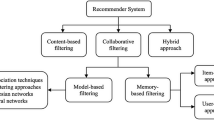Abstract
Within the music information retrieval community, many studies and applications have focused on tag-based music categorization. The limitation in employing music tags is the ambiguity of each tag. Thus, a single music tag covers too many sub-categories. To circumvent this, multiple tags can be used simultaneously to specify music clips more precisely. However, in conventional music recommendation systems, this might not be achieved because music clips identified by the system might not be prototypical to both or each tag. In this paper, we propose a new technique for ranking proper tag combinations based on the acoustic similarity of music clips. Based on empirical experiments, proper tag combinations are suggested by our proto-typicality analysis.






Similar content being viewed by others
Notes
References
Agrawal R and Srikant R (1994) Fast algorithm for mining association rules, Proc. Int. Conf. Very Large Data Bases, pp.487-499, Santiago, Chile
Chen W et al (2007) Document Transformation for Multi-label Feature Selection in Text Categorization, Proc. IEEE Int. Conf. Data Mining, Omaha, USA
Deng J, Leung C (2013) Music retrieval in joint emotion space using audio features and emotional tags. Lect Notes Comput Sci 7732(1):524–534
Font F, Serra J and Serra X (2012) Folksonomy-based Tag Recommendation for Online Audio Clip Sharing, Proc. Int. Soc. Music Information Retrieval, pp. 73–78, Porto, Portugal
Font F, Serra J, Serra X (2014) Class-based tag recommendation and user-based evaluation in online audio clip sharing. Knowl Syst 67(1):131–142
Fu Z, Lu G, Ting K, Zhang D (2011) A survey of audio-based music classification and annotation. IEEE Trans Multimed 13(2):303–319
Huron D (2000) Perceptual and cognitive applications in music information retrieval. Perception 10(1):83–92
Juslin P (2000) Cue utilization in communication of emotion in music performance. J Exp Psychol Hum Percep Per 26(1):1797–1813
Lamere P (2008) Social tagging and music information retrieval. J New Music Res 37(2):101–114
Lartillot O and Toiviainen P (2007) MIR in Matlab (II): A Toolbox for Musical Feature Extraction from Audio, Proc. Int. Soc. Music Information Retrieval, pp. 237–244, Vienna, Austria
Lin YC, Yang YY and Homer H (2011) Exploiting Online Music Tags for Music Emotion Classification, ACM Trans. Multimedia Comput. Comm. Appl., 78(1):Article 26
Liu B, Hsu W, Ma Y (1998) Integrating classification and association rule mining. Proc. Int. Conf Knowledge Discovery and Data Mining, New York
Miotto R and Orio N (2012) A Probabilistic Model to Combine Tags and Acoustic Similarity for Music Retrieval, ACM Trans. Information Systems, 30(2):Article 8
Nanopoulos A and Karydis I (2011) Know Thy Neighbor: Combining Audio Features and Social Tags for Effective Music Similarity, Proc. IEEE Int. Conf. Acoustics, Speech and Signal Processing, pp. 165–168, Prague, Czech
Ness S R, Theocharis A, Tzanetakis G, Martins L G (2009) Improving automatic music tag annotation using stacked generalization of probabilistic SVM outputs, Proc. 17th ACM Int. Conf. Multimedia, pp. 705–708, Beijing, China
Saari P et al (2013) The role of audio and tags in music mood prediction: a study using semantic layer projection, Proc. 14th Int. Soc. Music Information Retrieval, pp. 201–206, Curitiba, Brazil
Song Y, Dixon S, Pearce M and Halpern A (2013) Do Online Social Tags predict Perceived or Induced Emotional Responses to Music?, Proc. 14rd Int. Soc. Music Information Retrieval, pp. 89–94, Curitiba, Brazil
Tax D (2000) Data Description in Subspaces, Proc. 15th Int. Conf. Pattern Recognition, pp. 672–675, Barcelona, Spain
Tingle D, Kim YE, Turnbull D (2010) Exploring automatic music annotation with “acoustically-objective” tags, Proc. 11th Int. ACM Conf. Multimedia Information Retrieval, pp. 55–62, Philadelphia, USA
Trohidis K, Tsoumakas K, Kalliris G, Vlahavas I (2008) Multi-label classification of music into emotions. Int. Soc Music Information Retrieval, Philadelphia
Turnbull D, Barrington L, Lanckriet G, and Yazdani M (2009) Combining Audio Content and Social Context for Semantic Music Discovery, Proc. 32nd Int. ACM SIGIR Conf. Research and Development in Information Retrieval, pp. 387–394, Boston, USA
Turnbull D, Barrington L, Torres D, Lanckriet G (2008) Semantic annotation and retrieval of music and sound effects. IEEE Trans Audio Speech Lang Proc 16(2):467–476
Wang DD, Li T and Ogihara M (2010) Are Tags better than Audio Features? The Effect of Joint Use of Tags and Audio Content Features for Artistic Style Clustering, Proc. 11th Int. Soc. Music Information Retrieval, pp. 57–62, Utrecht, Netherlands
Wang JC, Shih YC, Wu MS, Wang HM and Jeng SK (2011) Colorizing tags in tag cloud: a novel query-by-tag music search system, Proc. 19th ACM Int. Conf. Multimedia, pp. 293–302, Scottsdale, USA
Yang Y-H, Lin Y-C, Su Y-F, Chen H (2008) A regression approach to music emotion recognition. IEEE Trans Audio Speech Lang Proc 16(2):448–457
Zhao Z, Wang X, Xiang Q, Sarroff A, Li Z, and Wang Y (2010) Large-scale Music Tag Recommendation with Explicit Multiple Attributes, Proc. 18th Int. Conf. Multimedia, pp.204-410, Firenze, Italy
Acknowledgment
This research is supported by Ministry of Culture, Sports and Tourism (MCST) and Korea Creative Content Agency (KOCCA) in the Culture Technology (CT) Research & Development Program 2016.
Author information
Authors and Affiliations
Corresponding author
Rights and permissions
About this article
Cite this article
Lee, J., Chae, J. & Kim, DW. Effective music searching approach based on tag combination by exploiting prototypical acoustic content. Multimed Tools Appl 76, 6065–6077 (2017). https://doi.org/10.1007/s11042-016-3554-4
Received:
Revised:
Accepted:
Published:
Issue Date:
DOI: https://doi.org/10.1007/s11042-016-3554-4




